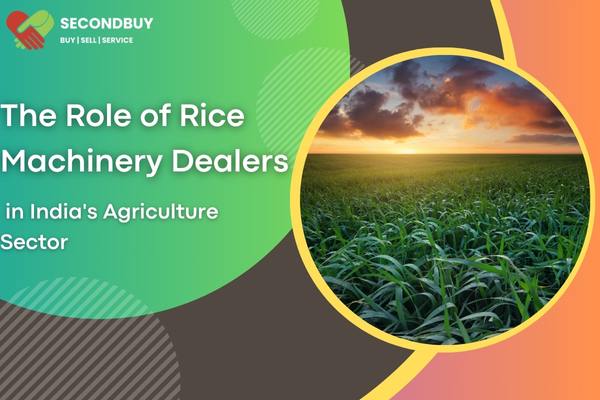The Role of Rice Machinery Dealers in India's Agriculture Sector
India's agricultural landscape is undergoing a transformation, driven by technological advancements and modernization. In this evolving scenario, the role of rice machinery dealers becomes pivotal, facilitating the integration of cutting-edge equipment into the traditional rice farming practices. This explores the significance of rice machinery dealers in India 's agriculture sector, shedding light on their contributions to enhancing efficiency, productivity, and sustainability.
The Evolution of Agriculture in India:
For centuries, rice has been a staple in Indian cuisine and a cornerstone of the country's agriculture. With the increasing demand for rice and the challenges posed by traditional farming methods, there is a growing need for modern solutions. Rice machinery dealers in India play a crucial role in bridging this gap, bringing state-of-the-art equipment to the hands of farmers across the nation.
Access to Technological Advancements:
Rice machinery dealers in India serve as a gateway to the latest technological advancements in the field. They connect farmers with cutting-edge equipment designed to streamline every stage of rice cultivation, from planting to harvesting.
Customized Solutions for Diverse Farms:
India's agriculture sector is diverse, with varying scales of operations. Rice machinery dealers in India understand the unique needs of farmers and offer a range of machinery, from small-scale equipment suitable for individual farms to large-scale solutions for commercial rice production.
Education and Training:
Recognizing that the successful implementation of modern machinery requires knowledge and skills, Rice machinery dealers in India often provide education and training programs. This ensures that farmers can harness the full potential of the equipment, maximizing their yields and minimizing resource use.
Supporting Sustainable Agriculture:
Many rice machinery dealers in India prioritize sustainability by offering equipment that promotes efficient use of resources, minimizes environmental impact, and encourages eco-friendly farming practices. This aligns with the global push for sustainable agriculture and responsible land management.
Enhancing Productivity and Efficiency:
The adoption of modern rice machinery results in increased productivity and operational efficiency. Automated planting, precision farming techniques, and advanced harvesting methods contribute to higher yields, reducing the labor-intensive nature of traditional rice farming.
Facilitating Financial Access:
Rice machinery dealers in India often collaborate with financial institutions to provide farmers with access to loans and financing options. This enables farmers to invest in the latest machinery without facing significant financial burdens, fostering the widespread adoption of modern agricultural practices.
Building a Supportive Community:
The relationship between rice machinery dealers and farmers goes beyond transactions. Dealers often establish a supportive community by organizing workshops, events, and forums where farmers can share experiences, learn from each other, and stay updated on the latest developments in agricultural technology.
Technological Integration for Precision Agriculture:
Rice machinery dealers contribute to the rise of precision agriculture by introducing technologies like GPS-guided tractors and drones. These innovations enable farmers to optimize resource use, reduce waste, and achieve precise planting and harvesting, leading to higher yields and cost-effectiveness.
Adaptation to Climate Challenges:
Climate change poses a significant challenge to agriculture. Rice machinery dealers play a vital role in helping farmers adapt to these challenges by offering equipment that can withstand changing weather patterns and providing guidance on climate-smart practices.
Data-Driven Decision Making:
The modern rice farmer is not just a cultivator but a data-driven decision-maker. Rice machinery dealers introduce equipment equipped with sensors and data analytics capabilities, allowing farmers to collect and analyze real-time data. This information enables informed decision-making, from optimizing irrigation schedules to monitoring crop health.
Conclusion
In India's agriculture sector, the role of rice machinery dealers extends far beyond being mere suppliers of equipment. They serve as catalysts for change, driving the adoption of modern technology that transforms traditional farming practices. By providing access to cutting-edge machinery, offering education and support, and fostering sustainable practices, rice machinery dealers contribute significantly to the growth and prosperity of India's rice cultivation. As the agricultural landscape continues to evolve, the partnership between farmers and machinery dealers becomes increasingly vital for a sustainable and productive future.

